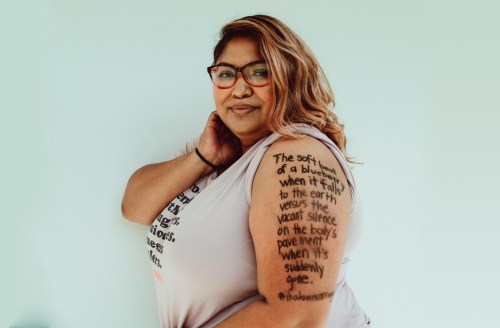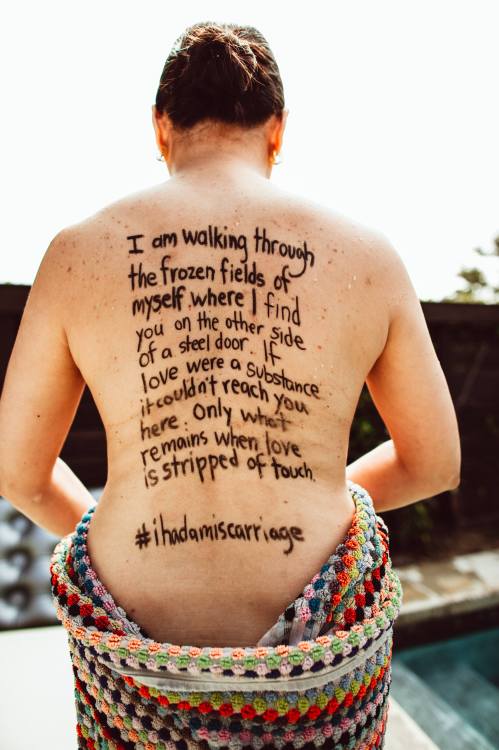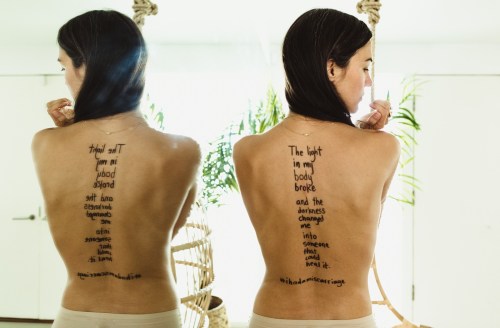Why we need a ritual to cope with pregnancy loss
#IHadAMiscarriage founder Jessica Zucker's partnered with Skin on Sundays to raise awareness around the need for rituals to help women coping with miscarriage.

Famed relationship expert Esther Perel once told me that American culture is deficient in ritual. In agreement is Jessica Zucker, PhD, a clinical psychologist who specializes in reproductive and maternal mental health and founded the #IHadAMiscarriage campaign years after she herself suffered a traumatic miscarriage at 16 weeks. She believes society needs something to help those dealing with pregnancy loss move through the process of grief. As of now, such a ritual doesn’t exist—but Dr. Zucker is working to change that: The latest installment of her work is aimed at undoing the culture of silence around this common and yet somehow unspeakable event.
I’m moved by her description of Japanese Jizo statues. These figures, which can be found standing guard in temples and cemeteries, are meant to provide protection for children and unborn babies, and are sought by those dealing with miscarriage (and any offspring loss) as a source of comfort—flowers are placed alongside them, incense is burned, and the stone figures are dressed in warm clothing. Within Japanese society, this is a highly normalized process. And yet, we have nothing remotely similar in the United States.

“What’s so beautiful and profound is that [this ritual] is in plain sight, integrated into the city, into daily life—I spent several hours at the foot of the Zojo-ji temple in Tokyo amidst countless Jizo statues [and witnessed] loads of people coming and going, visiting statues, while others walked by as they were going about their day,” Dr. Zucker says. “This is exactly what I would like to see [in the US]—ritual incorporated into everyday life.”
To raise awareness around this void and provide inspiration for those looking to create rituals and memorializations of their own, Dr. Zucker has partnered with Jessica Lakritz, an artist known for what she calls physiopoetry. Working under the Instagram handle @SkinonSundays, Lakritz connects with individuals, writes poems based on her intimate conversations with them, and then inscribes the poetry on the subject’s body for photographs. For this collaboration, Dr. Zucker connected Lakritz with nine women who had experienced—or, more accurately, continue to experience—pregnancy loss. Those women, as well as Dr. Zucker herself, shared their stories with Lakritz, who then created personalized poems for each subject.

At the photoshoot that followed, wherein each woman was photographed bearing her poem, Dr. Zucker asked the women to respond to three questions. “I ritualize my pregnancy losses or loss by or through…”, “When I envision a future that replaces silence with storytelling I feel…”, and “What does this more idyllic culture of openness around pregnancy and infant loss include?” You can watch their emotional answers in the video below.
In the process of this collaboration, a special thing happened; something that speaks to the power of breaking the silence around pregnancy loss. When Lakritz shared details of the project with her mom, her mom shared that Lakritz is what’s known as a “rainbow baby,” or the child born following a miscarriage. She had no idea. “I find it fascinating that there’s something about my being that drew me into the project in the first place and connected me with Dr. Zucker,” she says. “I had this deeper connection with pregnancy loss I didn’t even realize.”
Given that an estimate 15-20 percent of pregnancies end in miscarriage, it’s a safe assumption that most women have a deeper connection to pregnancy loss than they realize. And since few things heal pain quite like the feeling of not being alone in it, it’s this kind of communication Dr. Zucker is ultimately working to enable on a mass scale.

To that end, when I pose the last of Dr. Zucker’s questions back to her—”What does this more idyllic culture of openness around pregnancy and infant loss include?”—she tells me she boils it down to replacing silence with storytelling, as the women who participated in this project have done. “In a more idyllic culture, no woman feels ashamed, no woman feels guilty, no woman feels isolated, no woman feels silenced, no woman feels stigmatized, no woman feels abnormal, no woman feels alone, no woman feels alienated from her community, and no woman feels like a failure,” she says. “Grief is normalized—people can actually be comfortable with the grief and ritualize it.”
While we’re on the subject, it’s 100-percent normal to be angry after a miscarriage. If you’re among those experiencing a loss, find out why a “griefcation” can help.
Sign Up for Our Daily Newsletter
Get all the latest in wellness, trends, food, fitness, beauty, and more delivered right to your inbox.
Got it, you've been added to our email list.










